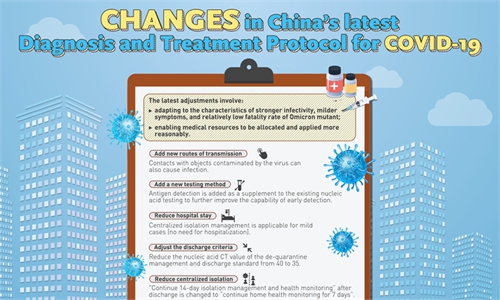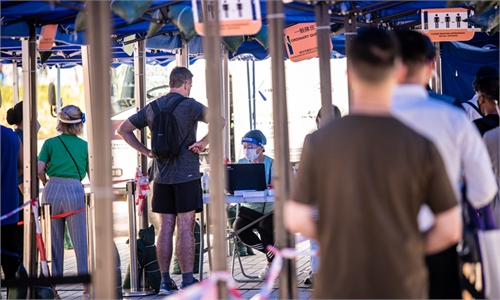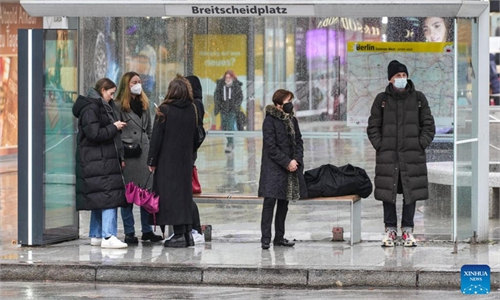China updates its COVID-19 playbook to allow mild symptoms patients undergo collective quarantine
Home quarantine possible when effective medicines at hand, strong immunity established: analysts
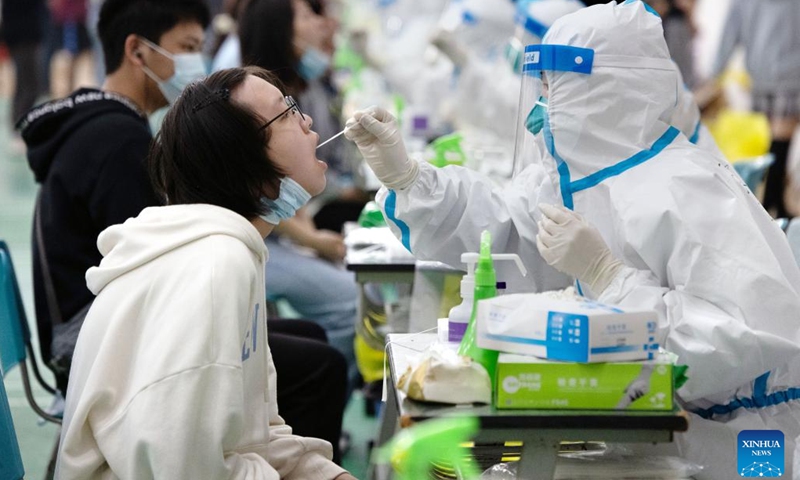
A medical worker takes a swab sample from a student for nucleic acid test at a university in Qingpu District of east China's Shanghai, March 14, 2022. Medical workers from the Xianghuaqiao community medical service center in Qingpu District of Shanghai joined the battle against the recent COVID-19 resurgence. They have collected more than 56,000 samples for nucleic acid testing since the latest resurgence in March. Photo: Xinhua
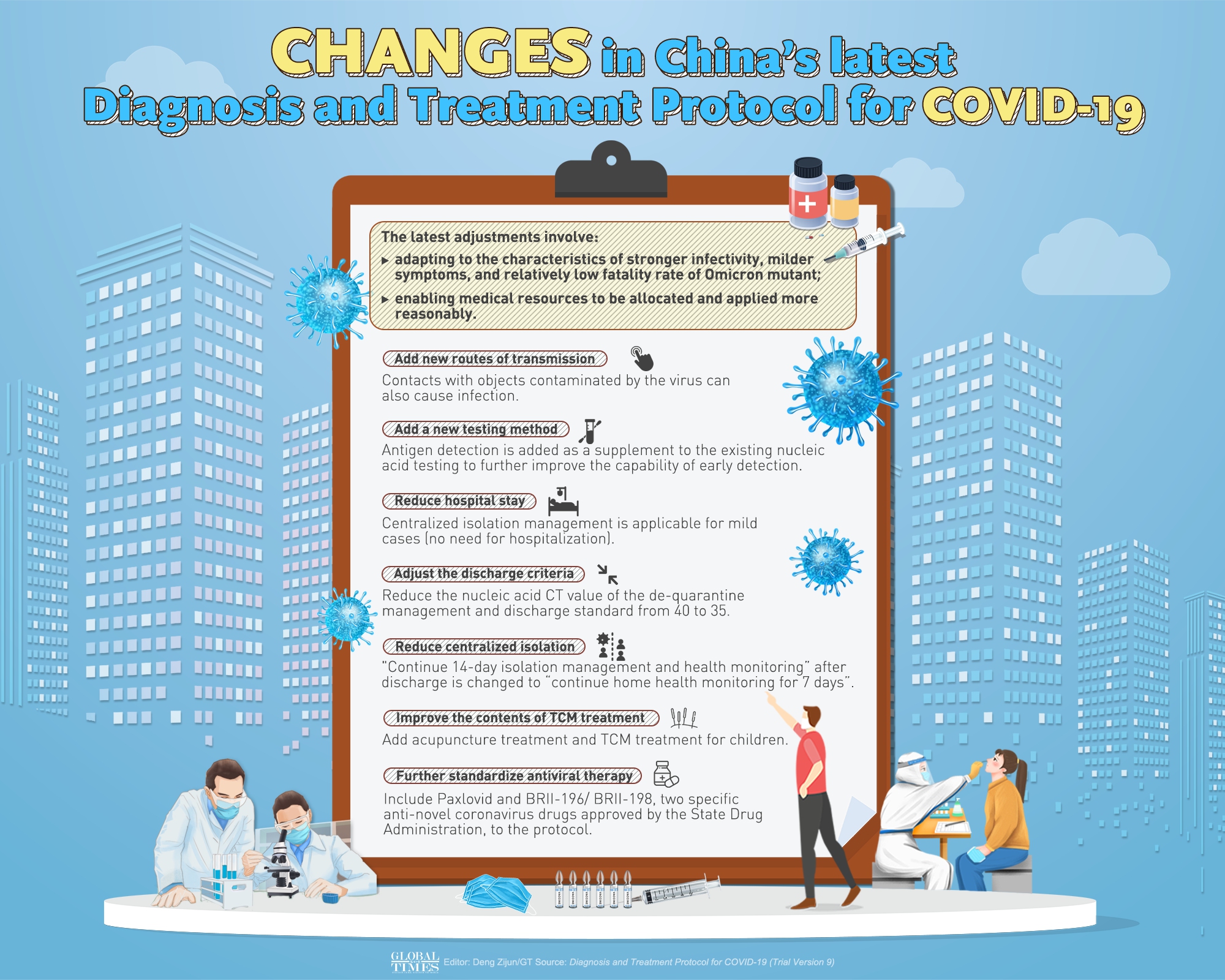
Changes in China's latest Diagnosis and Treatment Protocol for COVID-19 Infographic: Deng Zijun/GT
China updated its COVID-19 playbook on Tuesday night, ordering COVID-19 patients with mild symptoms to go to centralized quarantine facilities instead of being hospitalized, and lowering the bar for patients to be discharged from hospital. Top epidemiologists hailed the adjustment as a "scientific and pragmatic" change that helps relieve pressure on the medical system as the country is facing the most severe outbreaks in two years, and they said that in no way can the adjustment be interpreted as the country "lying flat" facing the recent surge.
The National Health Commission (NHC) updated the treatment playbook for COVID-19 on Tuesday based on the transmission characteristics of the virus' variants, including Omicron and its strains, as well as the high proportion of mild cases.
It said that patients with mild symptoms should go to quarantine in centralized isolation facilities, rather than being taken directly to hospital as originally required. They will be admitted to hospital only when their condition worsens.
Zeng Guang, former chief epidemiologist of the Chinese Center for Disease Control and Prevention (Chinese CDC), said this is an "important, scientific and pragmatic" adjustment of China's approach to COVID-19 treatment and the optimized dynamic zero-COVID strategy.
"This relieves pressure on our medical system and is a push for a categorized treatment of COVID-19 patients," Zeng told the Global Times, noting that he hopes similar optimized measures will be released in the future.
China is battling the wave of the most severe COVID-19 outbreaks - mostly caused by Omicron and its strains - in two years, with more than 15,000 domestically transmitted positive cases recorded in half a month. The outbreaks have affected 28 provincial-level localities, including Shenzhen in Guangdong Province, Shanghai and Jilin Province.
Lei Zhenglong, an NHC official, said at a Tuesday conference that most of those infected showed no symptoms or just mild symptoms.
Wang Guiqiang, an NHC advisor and director of the Infectious Diseases Department at Peking University First Hospital, said that patients with mild symptoms are in little danger and do not require special treatment, yet they need to be quarantined to prevent further transmission. Wang noted this move is also to avoid hospitals from being overwhelmed.
He opined that the adjustment was made in accordance with the new characteristics of China's current outbreaks, where a large proportion of patients have shown only mild symptoms and there is a relatively low mortality rate. The changes should not be interpreted as signal for China to "lie flat" as cases surge, Wang argued.
Chinese authorities last week allowed the public use of the first antigen self-test kits as a dynamic adjustment of the epidemic prevention measures. According to the trial protocol, antigen testing will be added as a supplement to helping detect cases at an early stage. Suspected or positive cases marked with antigen tests will be required to take nucleic acid test immediately.
Those who test positive for antigens should notify community workers, and then be transferred to have nucleic tests, Jiao Yahui, another NHC official, said on Tuesday.
Another senior expert at the CDC who requested anonymity told the Global Times on Wednesday that in the future when China relaxes its COVID-19 policies, those without symptoms can just stay at home for self quarantine, similar to the method that Hong Kong is currently using. Yet he emphasized that this scenario would be feasible only when China has built strong immunity, with effective vaccines, medications and cooperative measures in hand.
Additionally, the standards for lifting quarantine and discharging from hospital have been adjusted. Now, patients with a CT value of nucleic test equal to or higher than 35 - instead of 40 - can be discharged from the hospital. Recovered patients will undergo seven days of home health monitoring instead of a14-day quarantine.
China has always adopted a positive determination standard with a cut-off of a CT value at 40, which is higher than the international norm. Wang said the previous standard had rendered many people, who already would be incapable of passing the virus, keep staying in the hospital and consume medical resources.
The new playbook also included the use of Pfizer's COVID-19 antiviral drug Paxlovid and domestically made monoclonal antibodies BRII-196 and BRII-198 in the treatment plan.
China Meheco,a Chinese distributor of pharmaceutical and healthcare products, announced on March 9 in a statement that it had successfully signed a license to sell Pfizer's oral drug in the Chinese market, making it the exclusive distributor of the country's first COVID-19 oral drug. The Pfizer oral drug is yet to be distributed in the Chinese mainland.
China's National Medical Products Administration announced on Tuesday that it is accelerating the approval process of COVID-19 medicines and antigen self-test kits.
Fast adaptation
Zeng said those adjustment are particularly applicable in areas where the virus is rife.
Northeast China's Jilin Province has become the hot spot in China's latest battle with the coronavirus, recording cases numbering in the thousands for four consecutive days.
Jilin has reported about 9,000 COVID-19 cases during this round of outbreak. The NHC said 8,201 people in Jilin were hospitalized as of Tuesday morning, 95 percent of whom are asymptomatic or have mild symptoms.
In order to cope with the rapid increase in infection cases, the province has built eight makeshift hospitals as of Wednesday, which are estimated to be able to provide 11,488 beds.
Li Luyao, a medical worker at one of the makeshift hospitals with a capacity of roughly 400 people, in the city of Jilin (namesake of the province), told the Global Times that makeshift hospitals now are only for people without symptoms or with mild symptoms, as per the new treatment plan. "Most of them are in stable conditions, and we provide them with medicines," said Li, noting that patients need only two negative nucleic acid tests with at an interval of at least 24 hours to be discharged from the hospital.


